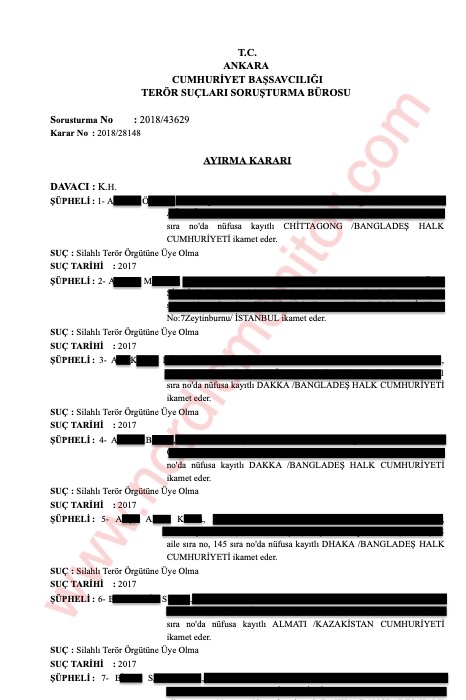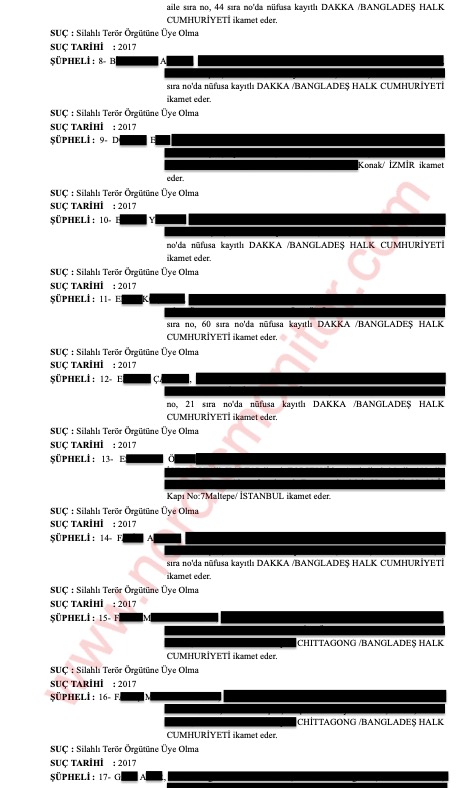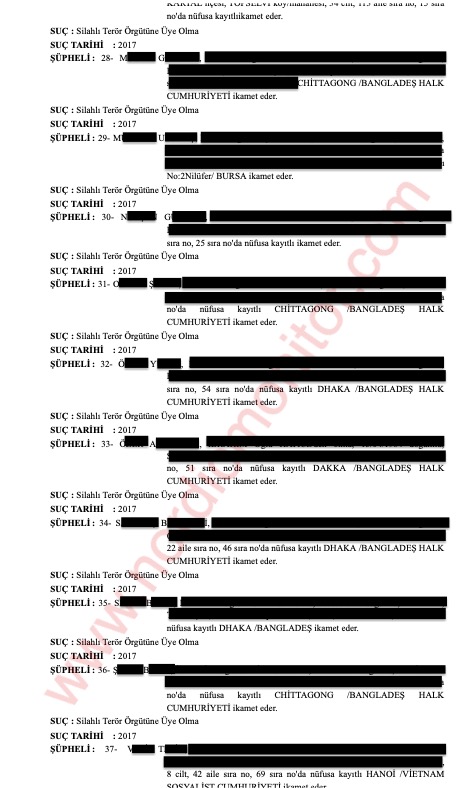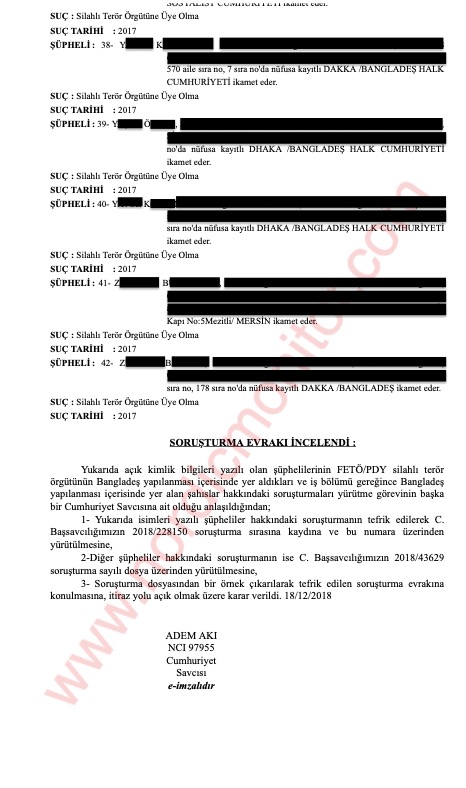Levent Kenez/Stockholm
Documents obtained by Nordic Monitor show that the Turkish Embassy in Bangladesh spied on Turkish citizens in the country and forwarded the illegal profiling list to Ankara, which led to the launch of groundless judicial procedures against them.
According to a December 18, 2018 decision by prosecutor Adem Akıncı, the Ankara Chief Public Prosecutor’s Office launched a separate investigation (file no.2018/28148) into 42 Turkish nationals who were listed in files dispatched by Turkish diplomats in Dhaka without any concrete evidence of wrongdoing. They were charged with “membership in a terrorist group” by Akıncı.
Judicial document dated December 12, 2018 reveals spying on critics .(The addresses and names of the Turkish nationals have been redacted for security reasons.):
The profiling documents were sent by Devrim Öztürk, the Turkish ambassador to Bangladesh between 2015 and 2019.

Nordic Monitor previously reported that the British High Commission (BHC) in Bangladesh handed over nine passports of Turkish critics and their children to the Turkish Embassy in Dhaka, supporting a systematic witch hunt carried out by the Turkish government against some of its nationals living abroad. Four educators who were working at the International Hope Schools in Dhaka, which is affiliated with the Gülen movement, a group critical of the Turkish government, and their five children applied to the BHC for UK visas at various times in 2017. When the wait was longer than expected, they requested the status of their applications and were told that their passports had been returned to the Turkish Embassy because they were no longer valid. Nordic Monitor has confirmed that holders of the passports given to the Turkish Embassy are on the profiling list above.
Critics of the Erdoğan government abroad, especially members of the Hizmet/Gülen movement, have been facing surveillance, harassment, death threats and abduction since President Recep Tayyip Erdoğan decided to scapegoat the group for his own legal troubles. They have often been denied consular services such as power of attorney and birth registry, as well as having their passports revoked. Their assets in Turkey are seized and their family members at home risk criminal charges.
Most recently educator Orhan İnandı, who was included in documents previously published by Nordic Monitor, was kidnapped in Kyrgyzstan on May 31 and illegally brought to Turkey by Turkish intelligence agency MIT. İnandı, who had lived in Kyrgyzstan for nearly 30 years, was arrested July 12 on charges of membership in a terrorist organization.
It is also known that Turkish embassies are spying on the private and confidential information of citizens who have registered for consular services. Nordic Monitor published a Turkish foreign ministry communiqué, stamped secret, showing that the Turkish Embassy in Kosovo profiled 78 people who had listed their professions as teachers when they made applications with the consulate for various citizen services. Similar work has apparently been done in other Turkish diplomatic missions at the request of the Security General Directorate (Emniyet), the main law enforcement agency in Turkey.
As previously disclosed by Nordic Monitor, the foreign ministry sent lists of profiled Turkish nationals in two CDs to the Ankara Chief Public Prosecutor’s Office, the national police and Turkey’s intelligence agency MIT on February 19, 2018 via an official document for further administrative or legal action, the punishment of their relatives back in Turkey and the seizure of their assets. Public prosecutor Akıncı, who received the foreign ministry document on February 23, 2018, forwarded the classified CDs including information on 4,386 Erdoğan critics to the Organized Crimes Unit of the Ankara Police Department for further action. The police conveyed the results of its investigations to the public prosecutor.
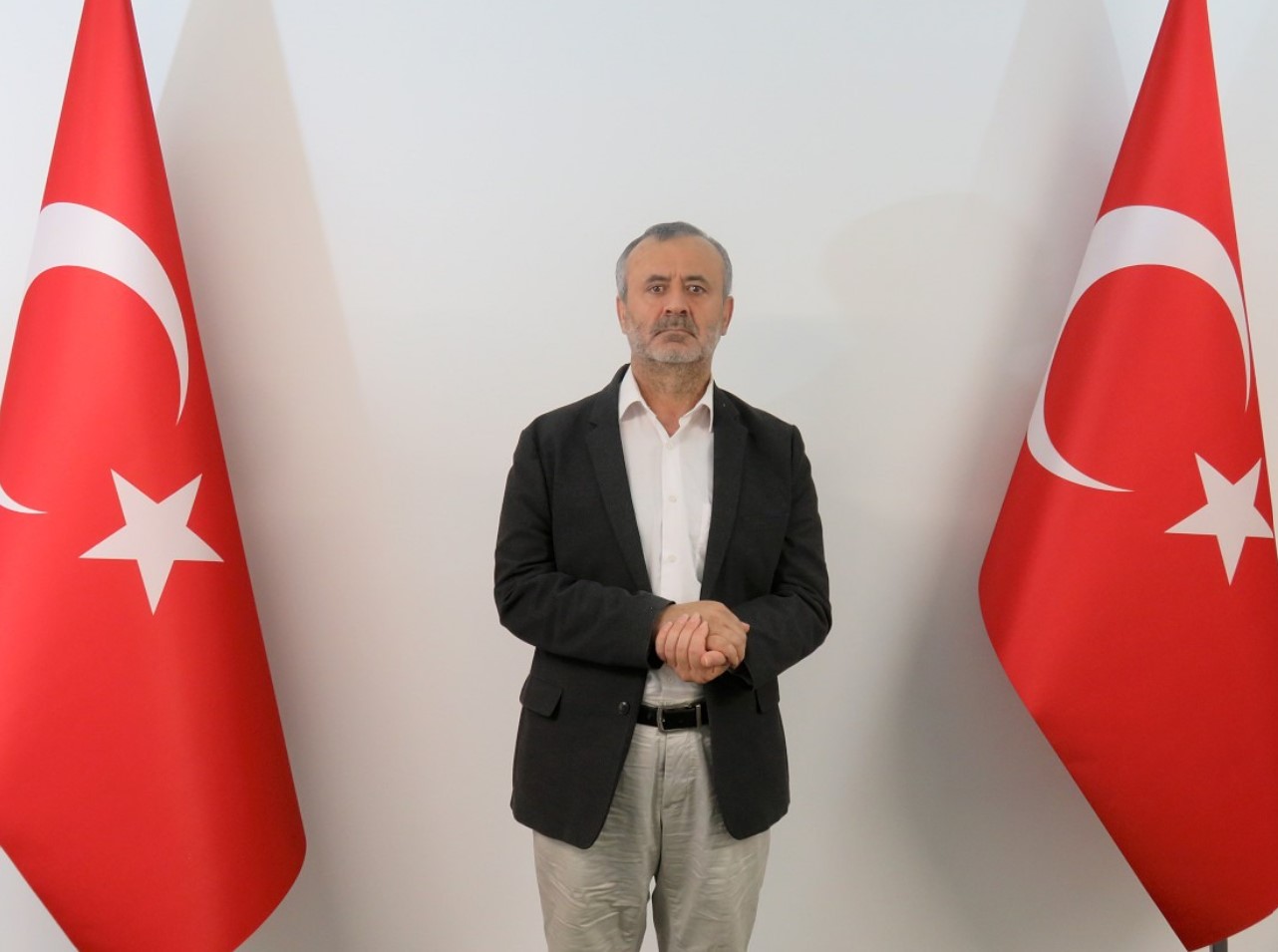
According to judicial documents released by the Ankara 4th High Criminal Court on January 16, 2019, the foreign ministry compiled a long list of foreign entities that were owned and/or operated by people who were seen as close to the movement.
Foreign Minister Mevlüt Çavuşoğlu confirmed systematic spying on Turkish government critics on foreign soil as by Turkish diplomatic missions in February, 2020. Çavuşoğlu said Turkish diplomats assigned to embassies and consulates have officially been instructed by the government to conduct such activities abroad. “If you look at the definition of a diplomat, it is clear. … Intelligence gathering is the duty of diplomats,” Çavuşoğlu told Turkish journalists on February 16, 2020 following the Munich Security Conference, adding, “Intelligence gathering and information collection are a fact.”


